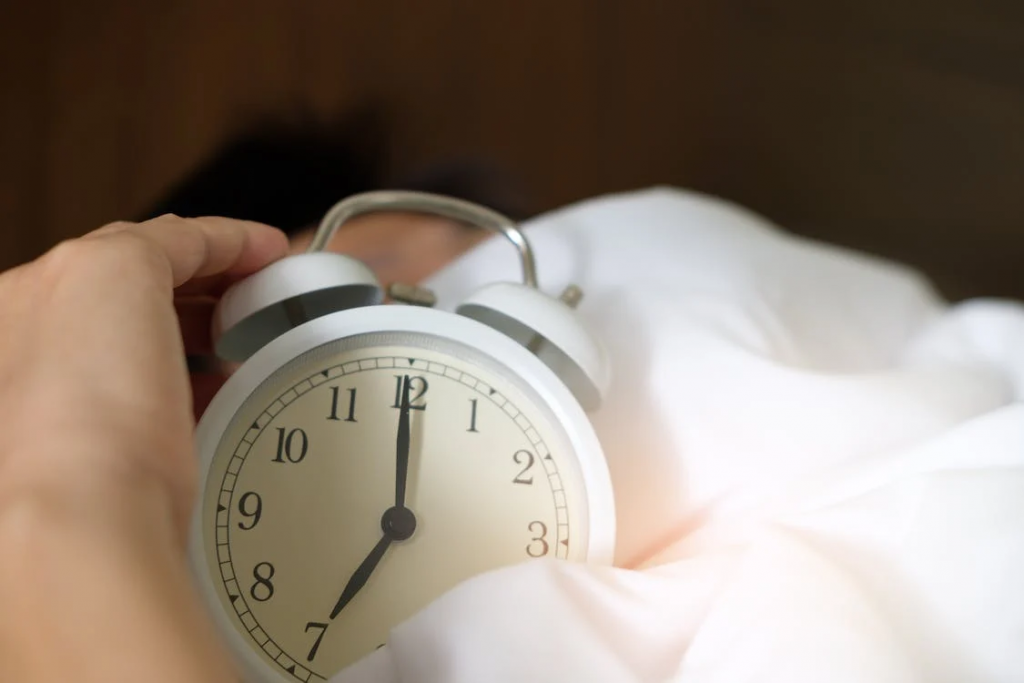| By Erica Marriaga, MSW, LCSW

Living in New Jersey in November linked with Daylight Savings Time means lighter mornings and darker evenings. This creates adjustments for some of us. What are your first thoughts when you think about early morning or evening activities and getting an extra hour of sleep? Will you actually get an extra hour of sleep or fill that time with something else?
Let’s Talk About Healthy Sleep Habits
According to The Sleep Foundation, “Getting good quality sleep can help you feel like your best self. Healthy sleep patterns improve learning, memory, creativity, and mood. Healthy sleep also strengthens the immune system and makes it easier to maintain a healthy diet.
In contrast, if you aren’t getting healthy sleep, you might feel slow, foggy, depressed, and low-energy. Sometimes, it is obvious when you are not sleeping well. In other cases, poor sleep and its adverse effects accumulate gradually, so it’s possible to become accustomed to them without recognizing the impact they are having on your health and life.
Take a step back and consider your sleep habits and your nightly experience of sleep. Not only does healthy sleep require successfully sleeping for a certain number of hours, it also means getting quality, uninterrupted sleep over the course of those hours and doing so with consistency.”
Tips for Improved Quality of Sleep
Be consistent with a sleep schedule. Awaken and retire at the same time each morning and night.
Exercise no later than 2–3 hours before your bedtime.
Refrain from drinking caffeine and avoid nicotine. The stimulating effects of caffeine in coffee, colas, certain teas, and chocolate can take as long as 8 hours to wear off fully. Nicotine is also a stimulant.

Refrain from drinking alcoholic beverages before bed. A “nightcap” might help you get to sleep, but alcohol keeps you in the lighter stages of sleep. You also tend to wake up in the middle of the night when the sedating effects have worn off.
Avoid large meals and beverages late at night. A large meal can cause indigestion that interferes with sleep. Drinking too many fluids at night can cause you to awaken frequently to urinate.
Avoid medicines that delay or disrupt your sleep, if possible. Some commonly prescribed heart, blood pressure, or asthma medications, as well as some over-the-counter and herbal remedies for coughs, colds, or allergies, can disrupt sleep patterns.
Don’t take naps after 3 p.m. Naps can boost your brain power, but late afternoon naps can make it harder to fall asleep at night. Also, keep naps to under an hour.
Relax before bed. Take time to unwind. A relaxing activity, such as reading or listening to music, should be part of your bedtime ritual.
Have a good sleeping environment. Get rid of anything in your bedroom that might distract you from sleep, such as noises, bright lights, an uncomfortable bed, or a TV or computer in the bedroom. Also, keeping the temperature in your bedroom on the cool side can help you sleep better.

Take a hot bath before bed. The drop in body temperature after the bath may help you feel sleepy, and the bath can help you relax.
Remember daylight savings time? Have the right sunlight exposure. Daylight is key to regulating daily sleep patterns. Try to get outside in natural sunlight for at least 30 minutes each day. Don’t lie in bed awake. If you find yourself still awake after staying in bed for more than 20 minutes, get up and do some relaxing activity until you feel sleepy. The anxiety of not being able to sleep can make it harder to fall asleep.
Reach Out to a Counselor to Help
As always, if you find yourself having difficulties with sleep impairment, do not hesitate to reach out for help. A licensed therapist or counselor can help empower you to be your best self!
Erica Marriaga is a proud fur-mama of her 2 rescue dogs, Toby and Tucker. She loves to spend time with her husband, son, and bond with her family, nieces, and nephews. Erica is passionate and enthusiastic about her role as a therapist. EWC has locations in Manalapan and Shrewsbury, NJ, and accepts a variety of insurances.
Check out Erica’s professional bio here!
Email Us: info@exceptionalwellnesscounseling.com
Call Now: (908) 415-2042
NEXT STEPS & RESOURCES
- Are you ready to take your first step? Reach out to us.
- Do you feel you may benefit from counseling during this time? Take the first step.
- Interested in online counseling? Learn more
- Interested in group counseling? Learn More
- Resources

